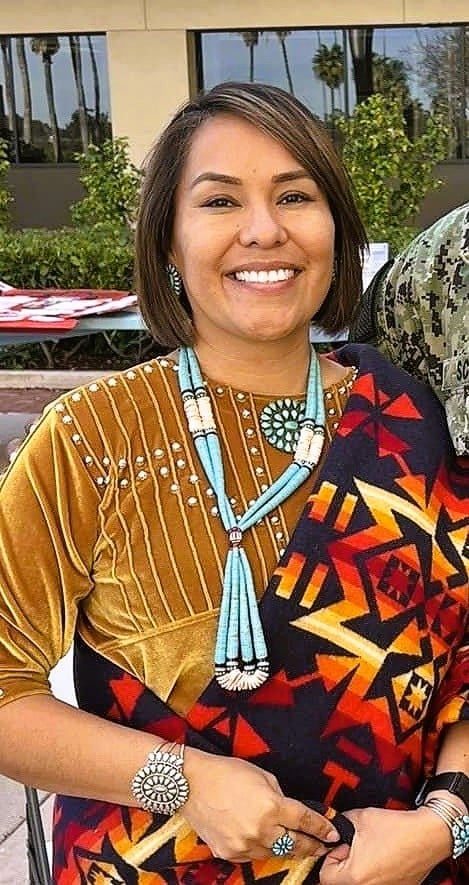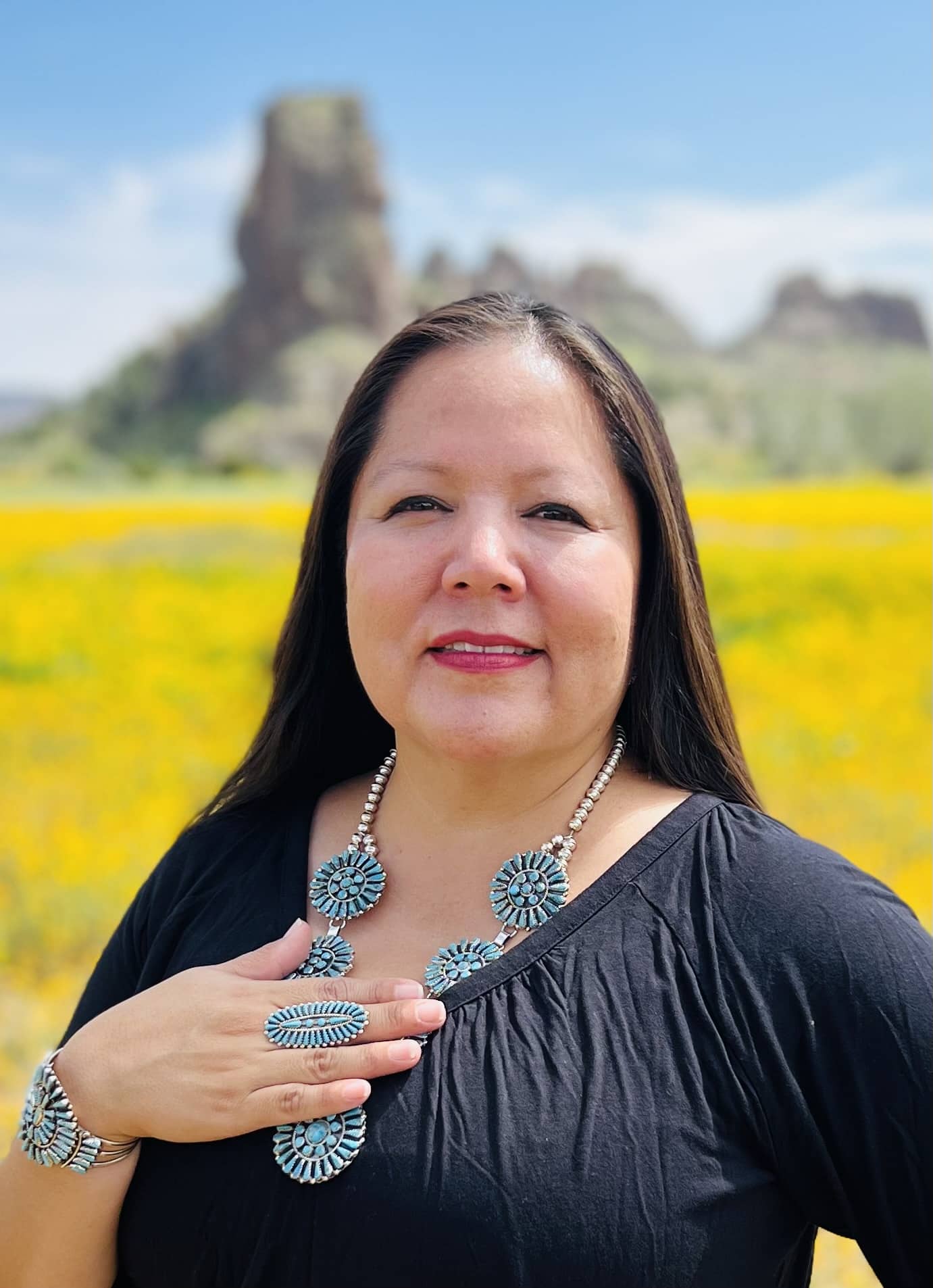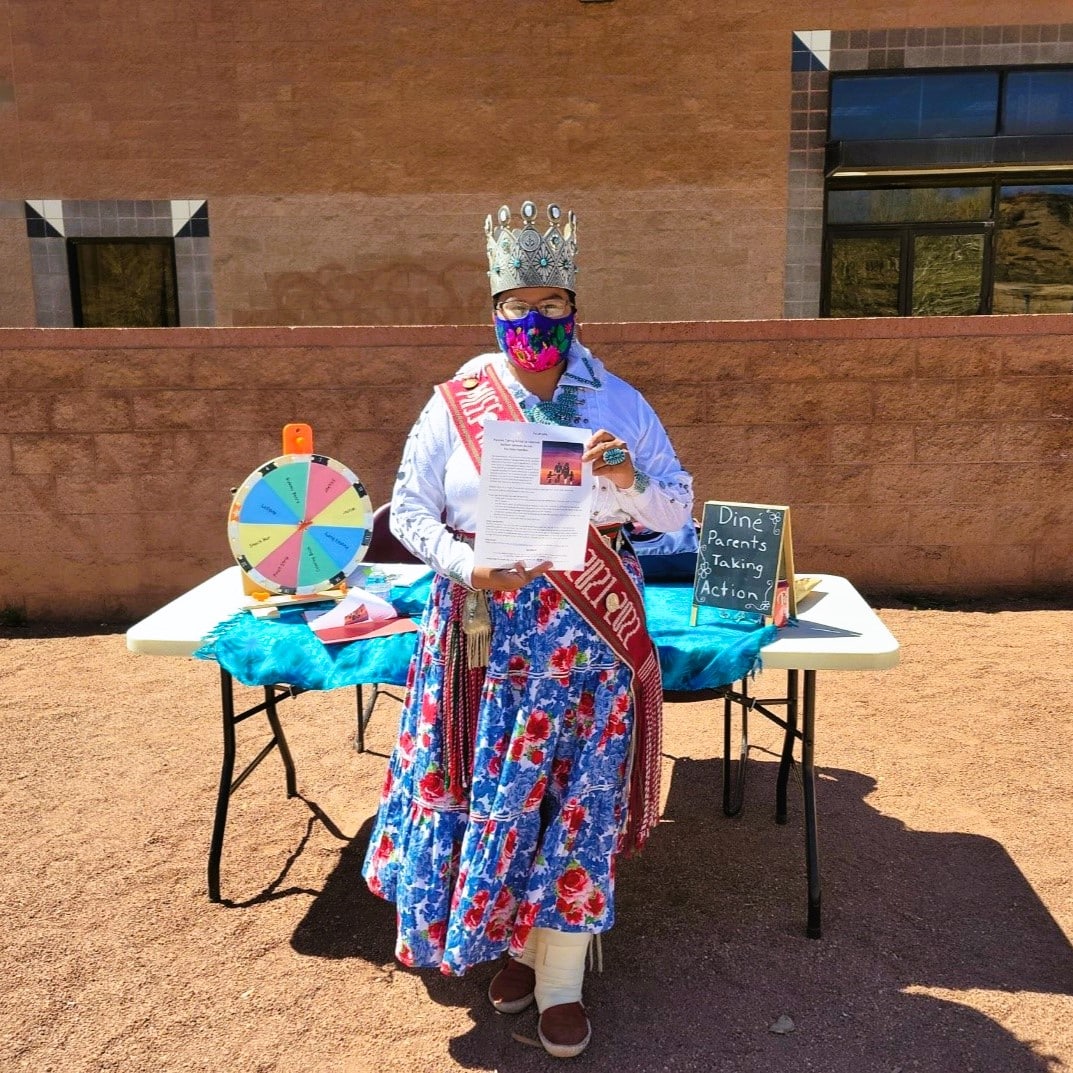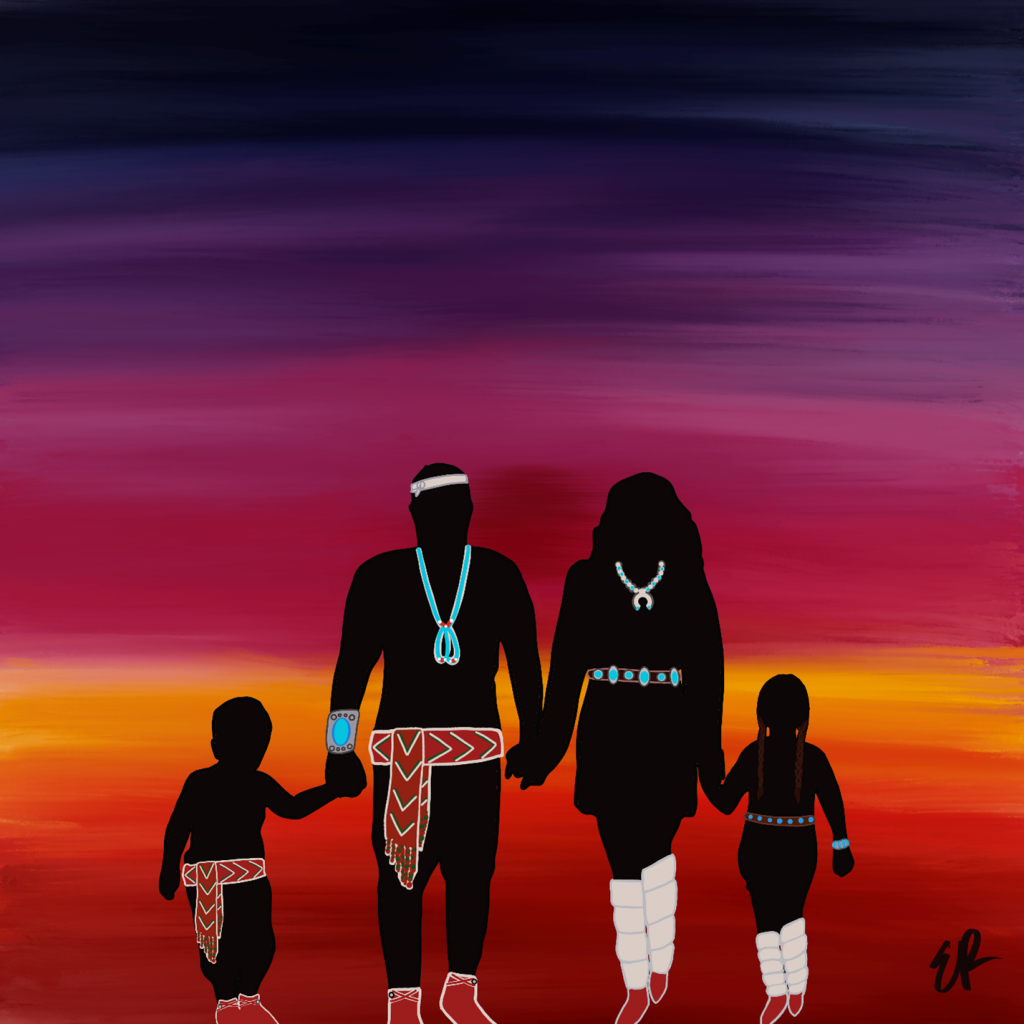Northern Arizona University researchers have developed Diné Parents Taking Action, a telehealth program that supports families with autistic children from underserved communities, specifically those living on and around the Navajo Nation, with a goal to improve access to developmental services. In addition to providing information and support for parents to improve outcomes for children with autism, the project has worked closely with the Diné community to successfully develop and implement the program. Olivia Lindly, assistant professor in the Department of Health Sciences, is the principal investigator and Candi Running Bear, Ph.D. candidate and early childhood educator, is the project’s coordinator.
What is Diné Parents Taking Action?
The program is based on Parents Taking Action, developed about 12 years ago for Latino families in the Midwest that has since expanded to include Chinese immigrant families in Chicago and Black families in Baltimore. While this program was originally conducted in person, Lindly’s team had to adapt their project’s approach to use telehealth during the COVID-19 pandemic, allowing the team to reach more Indigenous communities and families, expanding its recruitment area to all regions of the Navajo Nation and areas closer to Phoenix.
Lindly’s team for the project also includes Davis Henderson, assistant professor in the Department of Communication Sciences and Disorders, and two NAU undergraduate students, Anna Leaf and Erin Hill, who have worked on the project since last year. The project includes family advisors and a community advisory group comprised of 13 professionals and Diné parents, one of whom is Maureen Russell, occupational therapist for the NAU Institute for Human Development. The team also collaborates with faculty from ASU and the University of New Mexico, including Sara Nozadi and Brandon Rennie, who are part of the Navajo Birth Cohort Study.

Shannon Bia, a family advisor in the Diné Parents Taking Action project, is Diné and grew up in the Canyon de Chelly area. Also a graduate student, she is currently serving year 26 as an active-duty sailor in the U.S. Navy and is a mom to a very bright 14-year-old. She became involved in the project after seeing a flier on social media seeking Diné parents of a child with autism to participate in a study.
“I immediately contacted Dr. Lindly because I know how important it is to participate in studies like this. Unfortunately, I did not qualify because my son was older than the study criteria,” she said. “However, the project still needed family advisors! This meant I could learn all the information from the Diné PTA modules, engage directly and teach the information to other Diné parents of a child with autism. A win-win!”
“The family advisors and the community advisory group have helped shape our project and its success. We also have presented our project to the Navajo Nation Agency Councils and other relevant governmental entities such as the Diné Department of Education to gather their feedback on our work,” Lindly said. “In addition, we obtained approval for our project from the Navajo Nation Human Research Review Board. We believe these community-engaged processes have helped our project along its way.”
The community advisory group includes individuals who identify as Diné parents that have a child with autism or are health professionals working with Diné children with autism and their parents. Christine Vining, a Navajo bilingual speech-language pathologist, is an advisory board member providing input and feedback to Lindly and her team.
“My hope is that there is more awareness of the challenges parents experience in accessing services for their children with ASD. It is important that more parents receive information about strategies for working with their children with autism,” Vining said. “Developing materials and parent training adapted for Diné families are essential to ensure culturally responsive intervention.”
Autism Acceptance Month and Diné Parents Taking Action project in action
April is Autism Acceptance Month, a time dedicated to promoting awareness, acceptance and understanding of autism. Affecting approximately one in 36 children in the United States, autism spectrum disorder (ASD) is not uncommon. Despite its prevalence, autism remains widely misunderstood, leading to stigma and discrimination against individuals with autism and their families. Autism Acceptance Month aims to challenge these misconceptions and promote a more inclusive society that values and supports people with autism.
Through education, advocacy and community events, Autism Acceptance Month seeks to raise awareness of the challenges faced by individuals with autism and promote acceptance and inclusion for all. The researchers and collaborators of Diné Parents Taking Action continually strive to meet these goals in their project. In addition to the materials provided by the research group, family advisors are taken through the curriculum, so they can then share with even more parents thereby expanding the reach of the program.
“I have a rewarding experience each time I offer a Diné Parents Taking Action session to a parent, and they inquire for more information. I hope to continue sharing this valuable information with other parents because, fundamentally, we learn best from experience and association,” Bia said.

Running Bear, who is graduating in May, has a treasure trove of teaching experience on the Navajo Nation and has dedicated her career to this cause. She believes it’s important to utilize qualitative and quantitative research methodologies and employ strategies to ensure that health services are culturally safe, equitable and have sufficient research behind them. Her research focuses on providing mental health services to Indigenous communities and building trust with community members. She draws upon her personal experiences and cultural identity in her work providing mental health services to Indigenous communities; she hopes to fill the research gaps she sees in this area.
“It is important to me that the projects I have facilitated and have been invited to participate in are beneficial to Indigenous populations,” Running Bear said. “It is one of the main reasons I chose to pursue my Ph.D. and become a researcher.”
According to the Centers for Disease Control and Prevention (CDC), autism means there are differences in the brain, and those with autism may communicate, interact and learn in ways different from others. Running Bear notes that autistic children often require a wide range of services, including physical, occupational and speech therapy, as well as parent training and interventions based on applied behavior analysis. There are issues with under-diagnosing and lack of support, especially in underserved communities. Telehealth services exploded during the pandemic, and Lindly notes these services are increasingly used to provide autism evaluation and other services to remote Indigenous communities. Lindly also realized they needed to extend the project’s timeline with the recognition that many families were overtaxed by illness and quarantine. It took time for everyone to get closer to pre-pandemic circumstances in which parents were more able to commit time to and authentically engage.
Lindly’s project is an example of telehealth utilization, flexibility and perseverance. Many parents currently participating in the program have reported that this is the first education and training about autism that they have received since their child was diagnosed. However, raising awareness about the program during the height of the pandemic was a challenge. Lindly addressed these challenges by giving virtual presentations at various community events, providing resources at early childhood events such as drive-through events hosted by the Navajo Nation Early Childhood Collaborative and using social media to help raise awareness about the project.

“We believe that by utilizing telehealth services for our project, we have been able to reach and involve more Diné families and communities than would have otherwise been feasible,” Lindly said. “Using telehealth services for our project has provided flexibility in scheduling and the location where program lessons are delivered might not have otherwise been possible. By reaching more families using telehealth services, it may be possible to help reduce persistent health inequities.”
Impact and future plans for Diné Parents Taking Action
Running Bear’s work as a doctoral student has included multiple research projects focusing on Native American children’s educational needs and parents. She conducted a single-case, alternating treatment design study on Native American preschool engagement using general picture books, culturally relevant books and squishy books. She found that shared reading was effective in keeping preschoolers engaged, and her dissertation will focus on increasing vocabulary for Navajo preschoolers with disabilities using culturally relevant dialogic reading. Another case study she conducted centered on a Native American parent’s perception of school readiness of their preschooler with a speech and language delay and the preschooler’s teacher. She found that parents may view school readiness differently than educators and that the parents’ view may be influenced by any delays their child may have.
Running Bear’s work has positively impacted the outcomes of her health programs, as she builds trust and rapport with community members. Her research aims and work with Diné Parents Taking Action are to build a foundation for more studies to benefit the educational outcomes of Native American students. Her future aspirations and goals include sharing the Dinè Parents Taking Action program with organizations interested in continuing the program and sharing her findings with Navajo Nation agencies and organizations working with Navajo families, including families who have children with disabilities.
“I believe it is important as a researcher who works with Indigenous communities to learn about and utilize decolonizing research methodologies,” Running Bear said.
Lindly is passionate about advancing health equity for diverse children with special health needs and their families. Lindly submitted for an Applied Research Competition grant through the Organization for Autism Research, which is a national autism foundation, and the project was one of six that were funded out of a total of 195 applications. The project also was awarded a Southwest Health Equity Research Collaborative (SHERC) pilot project grant. The project has been active for a few years now, and Lindly’s team is currently completing an evaluation of the program to learn more about participant-level improvements related to the program.
As they work to analyze the data, many participants have given positive feedback noting that the program providing social support is valued by the parents involved. Parents have also reported that the program has helped increase their understanding of autism and behavioral techniques that can be used to promote social communication and address challenging behaviors with their child. The feedback demonstrates the importance of applied research projects and their impact on promoting educational success for Indigenous children and other underserved communities.
The group recently published a research article related to their work with Diné Parents Taking Action. This qualitative study explores the experiences of Navajo parents raising a child with autism and identifies factors affecting their access to autism services. The study found that access to diagnostic and treatment services was influenced by emotional stress, long wait times, limited clinician training, social support, insurance coverage, care coordination, financial aid, service availability and cultural awareness. The study concludes that future initiatives must address sociocultural factors to improve health equity for Indigenous communities with autism.
Through their work, the Diné Parents Taking Action project has become a shining example of culturally responsive research that seeks to understand and support the needs of underserved communities.
“I hope this project gains so much notoriety (because of its success!) that autism support and services become available on the Navajo Nation” Bia said. “I hope this project becomes an enduring intervention offered by clinicians, stakeholders and Diné advocates because it is culturally tailored for Diné parents and caretakers.”
Cynthia Gerber | NAU Communications
(928) 523-7341 | Cynthia.Gerber@nau.edu




